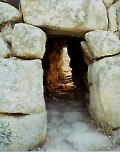Gerolamo Araolla lived in the 16th century. He wanted poetry-writing to be a means to enrich the Sardinian language. He expressed this in 1582 in a letter to his master.
Sardinian
"Semper happisi desiggiu, Illustrissimu Segnore,
de magnificare, & arrichire sa limba nostra Sarda; dessa matessi manera
qui sa naturale insoro tottu sas naciones dessu mundu hant magnificadu
& arrichidu; comente est de vider per isos curiosos de cuddas.[...]
Mi so forzadu pero cun su pagu donu qui sa natura mi hat dadu, redugher
in Ottava rima in limba nostra Sarda, Sa Vida, Martiriu, & Morte dessos
gloriosos Martires Gavinu, Brothu & Gianuare; pr'esser su pius heroycu
Poema conveniente assa materia dessu suggettu qui si trattat, quirchende
sempre fuire sa larghesa de cudda cun affinarela, & arrichirela de
robas non disconvenientes à issa, à megius qui happo potidu,
pro qui sos venidores cun pius animu potant satisfagher assos mancamentos,
& faltas dessos passados qui tanta injuria assa materna limba fetint;
servendelis custos sudores mios per primos instruhimentos simigiansa
dessa cuna assos qui nasquint; pro qui da cuddos cun discursu de tempus
a pius maiores ascender potant."
(Dae Ines Loi Corvetto in su libru "La Sardegna e la Corsica")
English
"I have always desired, Mylord Prince, to
magnify and enrich our Sardinian language; in the same manner in which
the nations of the world have magnified and enriched their natural languages;
as the ones curious about those can see. [...] I have strived, though with
the small gift that nature has given me, to reduce to octave rhymes in
our language the Sardinian, The Life, Martyrium and Death of the Glorious
Martyres Gavinu, Brothu and Gianuare; being the most heroical poem convenient
as a matter for the subject treated here, trying always to expand the limits
of the language, refining and enriching it with elements that are not inconvenient
for it, in the best manner I have been able to, so that the future generations
with more spirit can correct the lacunes and the errors of their ancestors,
who did so much injustice to their mother toungue. Thus I am serving them
with these my fatigues as first instruments of comparison to be at the
cradle of those to be born; so that from them by the passing of time those
instruments can ascend to greater things."
(Quoted from Ines Loi Corvetto in "La Sardegna e la Corsica")
Translation by Lone Elisabeth Olesen
 Continue
Continue

Sardinia
links
Sardinien
på dansk



